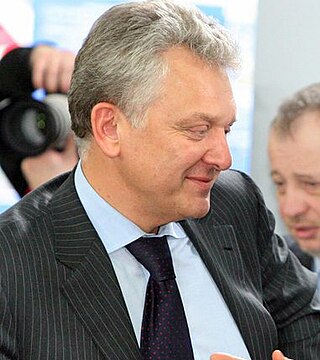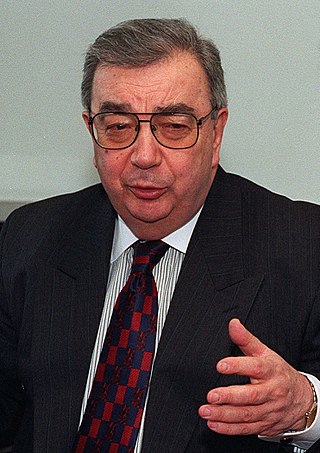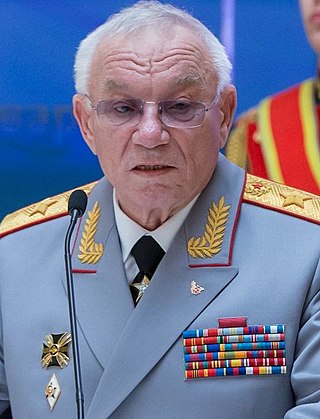
The modern history of Russia began with the Russian Republic of the Soviet Union gaining more political and economical autonomy amidst the imminent dissolution of the USSR during 1990–1991, proclaiming its sovereignty inside the Union in June 1990, and electing its first President Boris Yeltsin a year later. The Russian SFSR was the largest republic of the Soviet Union, but it had no significant independence before, being the only Soviet republic to not have its own branch of the Communist Party.

The chairperson of the government of the Russian Federation, also informally known as the prime minister, is the head of government of Russia. Although the post dates back to 1905, its current form was established on 12 December 1993 following the introduction of a new constitution.

Viktor Stepanovich Chernomyrdin was a Soviet and Russian politician and businessman. He was the Minister of Gas Industry of the Soviet Union, after which he became first chairman of Gazprom energy company and the second-longest-serving Prime Minister of Russia (1992–1998) based on consecutive years. He was a key figure in Russian politics in the 1990s and a participant in the transition from a planned to a market economy. From 2001 to 2009, he was Russia's ambassador to Ukraine. After that, he was designated as a presidential adviser.

Viktor Borisovich Khristenko is a Russian politician who was chairman of the board of the Eurasian Economic Commission from 1 February 2012 to 1 February 2016. He was First Deputy Prime Minister of Russia from 31 May 1999 to 10 January 2000 and Minister of Industry from 9 March 2004 to 31 January 2012.

Yevgeny Maksimovich Primakov was a Russian politician and diplomat who served as Prime Minister of Russia from 1998 to 1999. During his long career, he also served as Foreign Minister, Speaker of the Supreme Soviet of the Soviet Union, and chief of the intelligence service. Primakov was an academician (Arabist) and a member of the Presidium of the Russian Academy of Sciences.

Presidential elections were held in Russia on 26 March 2000. Incumbent prime minister and acting president Vladimir Putin, who had succeeded Boris Yeltsin after his resignation on 31 December 1999, was seeking a four-year term in his own right and won the elections in the first round.

Sergey Vladilenovich Kiriyenko is a Russian politician who has served as First Deputy Chief of Staff of the Presidential Administration of Russia since 5 October 2016. Previously he served as the 30th Prime Minister of Russia from 23 March to 23 August 1998 under President Boris Yeltsin. Between 2005 and 2016 he was the head of Rosatom, the state nuclear energy corporation. Kiriyenko was the youngest Prime Minister of Russia, taking the position at age 35.

Galina Vasilyevna Starovoitova was a Soviet dissident, Russian politician and ethnographer known for her work to protect ethnic minorities and promote democratic reforms in Russia. She was shot to death in her apartment building in 1998.

The Russian financial crisis began in Russia on 17 August 1998. It resulted in the Russian government and the Russian Central Bank devaluing the ruble and defaulting on its debt. The crisis had severe impacts on the economies of many neighboring countries.

Yevgeny Primakov's Cabinet was the seventh cabinet of government of the Russian Federation, preceded by Sergei Kiriyenko's Cabinet fallen as a result of the 1998 Russian financial crisis and followed by Sergei Stepashin's Cabinet. It was led by Prime Minister Yevgeny Primakov, proposed by President Boris Yeltsin on September 10, 1998, as Viktor Chernomyrdin had failed to be approved by the State Duma twice by September 7 ; According to the Constitution of Russia, if parliament rejects the president's nomination three times, then parliament must be dissolved and a general election held. On September 11 Primakov was approved by the Duma as Prime Minister and appointed Prime Minister by the President. In the State Duma only Vladimir Zhirinovsky's Liberal Democratic Party of Russia was both in favor of Chernomyrdin and against Primakov.

Pavel Vladimirovich Krasheninnikov is a Russian jurist and politician.

Viktor Alekseyevich Zubkov is a Russian civil servant, politician and businessman who served as the 36th Prime Minister of Russia from September 2007 to May 2008. He was Vladimir Putin's First Deputy Prime Minister during the presidency of Dmitry Medvedev.

Anatoly Sergeyevich Kulikov is a Russian General of the Army, former Interior Minister of Russia (1995–1998).

Mikhail Mikhailovich Zadornov is a Russian economist, Chairman of the Management Board of Otkritie FC Bank, President and Chairman of the Management Board of VTB 24 in the years 2005–2017, government official, Russian Minister of Finance from 1997–1999, Russian State Duma Deputy, 1st – 4th Convocations. Recipient of the Order "For Merit to the Fatherland" IV class and a Certificate of Honour from the Russian Government.
Vladimir Bulgak is a Russian engineer, bureaucrat and politician. He served in different capacities in various cabinets of Russia, including deputy prime minister.
Events from the year 1998 in Russia.

The presidency of Boris Yeltsin began with his first inauguration on 10 July 1991, and ended on 31 December 1999 when he announced his resignation. A referendum held on 17 March 1991 approved the creation of the post of president of Russia; Yeltsin was elected Russia's first president in a presidential election held on 12 June 1991.

The State Duma of the Federal Assembly of the Russian Federation of the 2nd convocation is a former convocation of the State Duma, Lower House of the Russian Parliament. The 2nd convocation meets at the State Duma building in Moscow, worked from December 17, 1995 – December 19, 1999.

The Mikhail Mishustin Cabinet is the federal government of Russia, formed in 2020, led by Prime Minister Mikhail Mishustin. It succeeded the previous one led by Dmitry Medvedev.

















